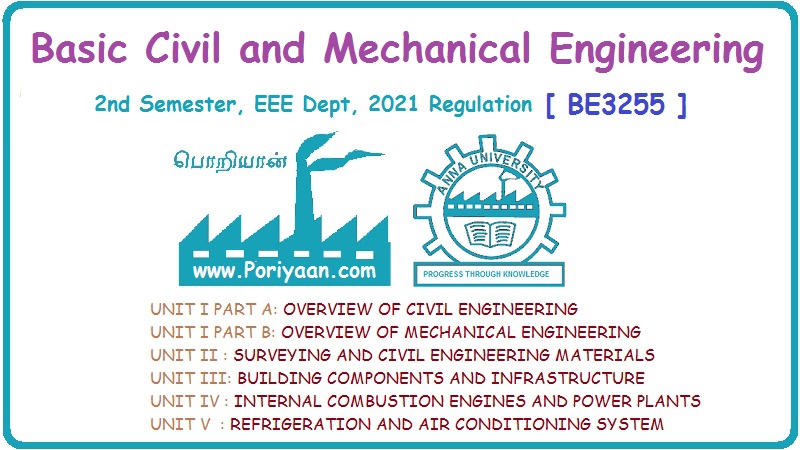Basic Civil & Mechanical Engineering: UNIT I: i. Overview of mechanical engineering
Specialized sub-disciplines in mechanical engineering
The major specialized sub-disciplines in mechanical engineering include the following
SPECIALIZED SUB-DISCIPLINES IN MECHANICAL ENGINEERING
The
major specialized sub-disciplines in mechanical engineering include the
following:
1.
Engineering Design
Engineering
design involves product development from an idea. The engineering design
process is a series of steps that engineers follow to come up with a solution
to a problem. Many times the solution involves designing a product (like a
machine, engine, etc.) that meets certain criteria and/or accomplishes a
certain task.
2. Production Engineering / Manufacturing Engineering
Manufacturing
is the backbone of any industrialized nation. It involves making products from
raw material by using various processes and by making use of hand tools,
machinery or computers. Manufacturing involves fabrication and joining
processes.
3. Thermal Engineering
Thermal
Engineering deals exclusively with heat energy and its transfer between
different mediums and also into various useful forms of energy such as
chemical, mechanical or electrical energy depending on the task. It involves
design, development and analysis of any thermal or fluid flow systems.
4. Automobile Engineering
Automobile
engineering deals with the various types of automobiles, methods of propulsion,
their mechanism of transmission and safety.
5.
Aerospace Engineering
Aerospace
engineering is the field of engineering concerned with the development of
aircraft and spacecraft. Aerospace engineers design primarily aircraft, spacecraft,
satellites, and missiles.
6.
Energy Engineering
Energy
is defined as the ability to cause changes. Energy engineering combines
knowledge from the fields of physics, mathematics and chemistry with economic
and environmental engineering practices. Energy engineers apply their skills to
increase efficiency and further develop renewable sources of energy. Also,
Energy engineers audit the use of energy in processes and suggest ways to
improve the performance of systems.
7. CAD/CAM/CIM
Computer
Aided Design (CAD) is the use of computer software to facilitate the
generation, modification, and optimization of a part or a compilation of parts.
CAD software helps users design ideas, visualize concepts, and simulate how
designs will perform in the real world. Computer-aided manufacturing (CAM) is
an application technology that uses computer software and machinery to
facilitate and automate manufacturing processes.
Computer
integrated manufacturing (CIM) integrates design, manufacturing and associated
business functions of a factory or a manufacturing facility. CIM reduces the
human component of manufacturing and thereby relieves the process of its slow,
expensive and errorprone component.
8.
Industrial Engineering
Industrial
engineering focuses on so many essential aspects that are necessary for an
industry to run smoothly. It helps in improving the quality, productivity,
efficiency, safety, health and working environment of industry.
Basic Civil & Mechanical Engineering: UNIT I: i. Overview of mechanical engineering : Tag: : - Specialized sub-disciplines in mechanical engineering
Related Topics
Related Subjects
Basic Civil and Mechanical Engineering
BE3255 2nd Semester 2021 Regulation | 2nd Semester EEE Dept 2021 Regulation
